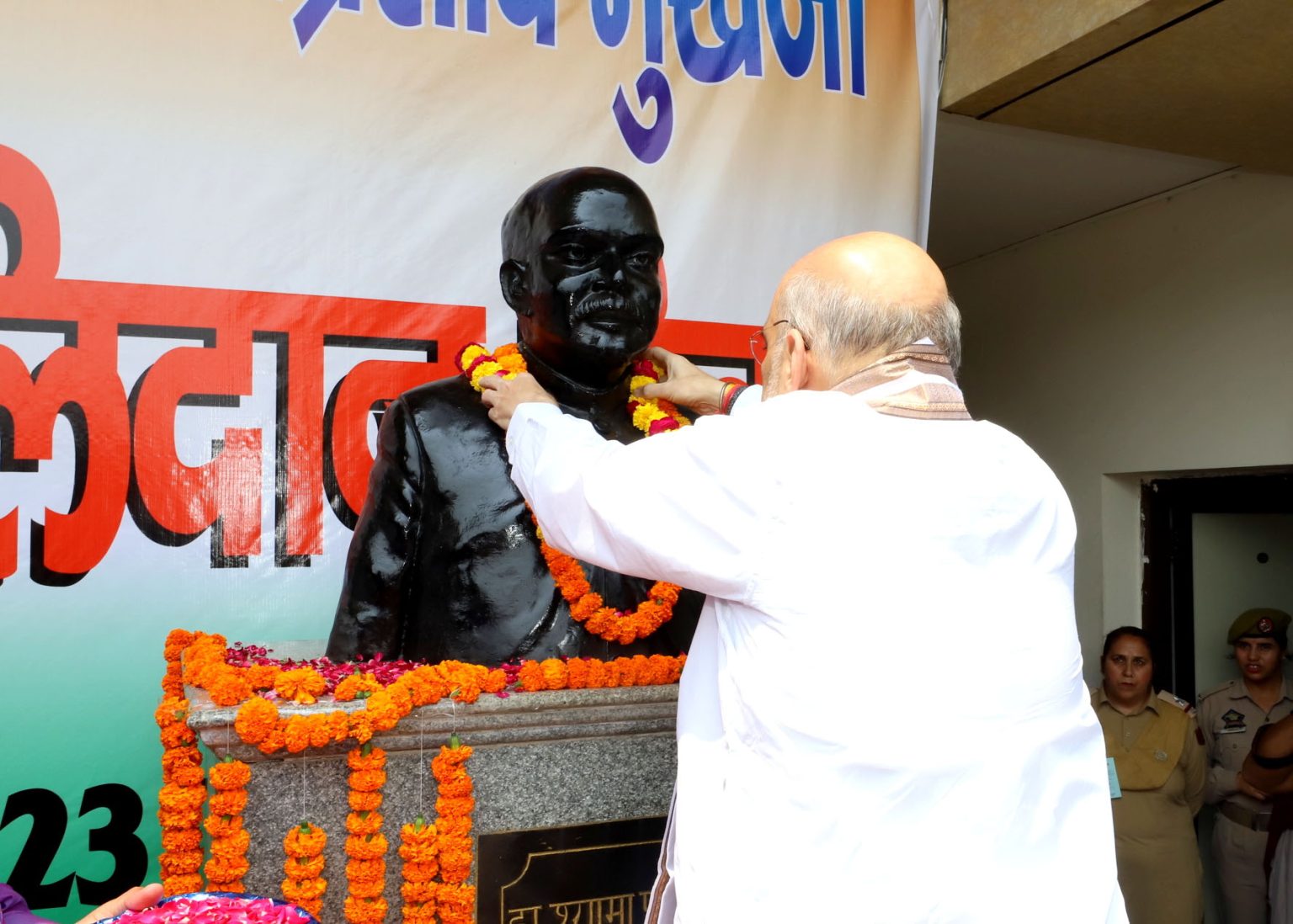Union Home Minister Amit Shah, who started his two-day visit to Jammu and Kashmir on Friday—his third after abrogation of Article 370 in August 2019—blamed the Indira Gandhi-Sheikh-Mufti troika for 42,000 civilian killings. He alleged that the Bharitya Jana Sangh founder Syama Prasad Mukhrjee had been “jailed and assassinated” in Kashmir during Sheikh Mohammad Abdullah’s first government in 1953.
Lashing out at the former ruling parties—Indira Gandhi’s Congress, Sheikh Mohammad Abdullah’s National Conference (NC) and Mufti Mohammad Sayeed’s Peoples Democratic Party (PDP)—Shah held them responsible for 42,000 killings in the erstwhile State from 1947 to 2014. Upon his arrival in Jammu, the Home Minister was addressing a gathering at Bhagwati Nagar on the occasion of the death anniversary of Syama Prasad Mukherjee. “Who was ruling during this period? Three families—the Gandhis, Abdullahs and Muftis”, he asserted.
Paying tribute to the BJP ideologue, Shah said that Mukherjee was illegally arrested in 1953 for entering Jammu and Kashmir without a permit. “Why should one need a permit to enter his own country? He was jailed and later assassinated,” Shah said. He nonetheless expressed satisfaction that “Mukherjee’s soul will be resting in peace as his mission and vision of Ek Vidhan, Ek Nishan, and Ek Pradhan stands fulfilled today.”
The founder of the BJP’s precursor Bhartiya Jana Sangh in 1951, Mukherjee was President of Akhil Bharatiya Hindu Sabha from 1943 to 1946. After independence, he functioned as a Minister in Jawahar Lal Nehru’s cabinet but resigned to protest the 1950 Delhi Pact with Pakistani Prime Minister Liaquat Ali Khan.
On 11 May 1953, Mukherjee was arrested by the Jammu and Kashmir government when he entered the State to protest against the law that prohibited Indian citizens from settling within the State. Indian citizens were not permitted to enter and move without the permit and a special Identity Card. He was lodged in Srinagar Central Jail and later shifted to a cottage. On 20 June 1953, he was diagnosed with dry pleurisy which he had also suffered in 1937 and 1944.
The doctor gave him streptomycin injection and powders. On 22 June, Mukherjee felt pain in the heart region, started perspiring and began feeling faint. He was shifted to a hospital where, according to the doctors, he died of a heart attack on 23 June 1953. His death in custody triggered speculation and allegations against Sheikh Abdullah’s government.
In 2004, Atal Behari Vajpayee claimed that Mukherjee’s detention was a result of the “Nehru conspiracy”. He said that his death had remained “even now an impervious mystery. In 2011, BJP called for an inquiry into Mukherjee’s death.
In his Jammu address, Shah said that Mukherjee was the first to oppose the inclusion of Article 370 in the Indian constitution, stating that “one nation can’t have two flags, two constitutions, and two heads.”
“On August 5, 2019, Prime Minister Narendra Modi took a big step and removed Article 370 forever, fulfilling Dr Mukherjee’s vision,” Shah said, adding that if West Bengal was with India today, it was only due to Dr Mukherjee’s vision.
Shah said that India was currently celebrating nine years of PM Modi’s rule. “Modi’s rule is an open book. It is not like the UPA that was marred by a Rs 12 lakh crore scam. There is not even a single corruption allegation against Modi during his nine-year rule,” he asserted.
Shah said that during the last nine years of the BJP government at the Centre, J&K had witnessed unprecedented development. He said that his government was tightening the noose on terrorism which was virtually on the deathbed. “In the UPA’s ten-year rule, there were 60,327 terrorism incidents. In Modi’s nine-year rule, terrorism reached its lowest ebb. In the 47 months after the abrogation of Article 370, there were only 32 calls for strikes, while stone pelting declined by 90 percent,” he said. “The youth of J&K have replaced stones with laptops and books.”
Shah mentioned that in 2022, for the first time, 1.88 crore tourists visited J&K.
Seeking support for Modi from the people of Jammu for the 2024 Parliamentary polls, he said there was no comparison “between Rahul Baba and Modi ji.” “We will win over 300 seats in the 2024 polls,” he said. The Home Minister said that the successful G-20 summit in Srinagar from May 22 to May 25 this year was a “grand success.”
“All foreign dignitaries have returned to their respective countries with the message of peace and the change in Kashmir after the abrogation of Article 370,” he said and credited LG Manoj Sinha for the smooth conduct of the G-20 summit in Srinagar.
The Home Minister is scheduled to fly to Srinagar in the evening on Friday where he has a packed schedule of engagements including chairing a security review meeting, laying foundation stone for the martyrs’ memorial at Pratap Park and some meetings with the party leaders. He will be returning to New Delhi on Saturday.




















